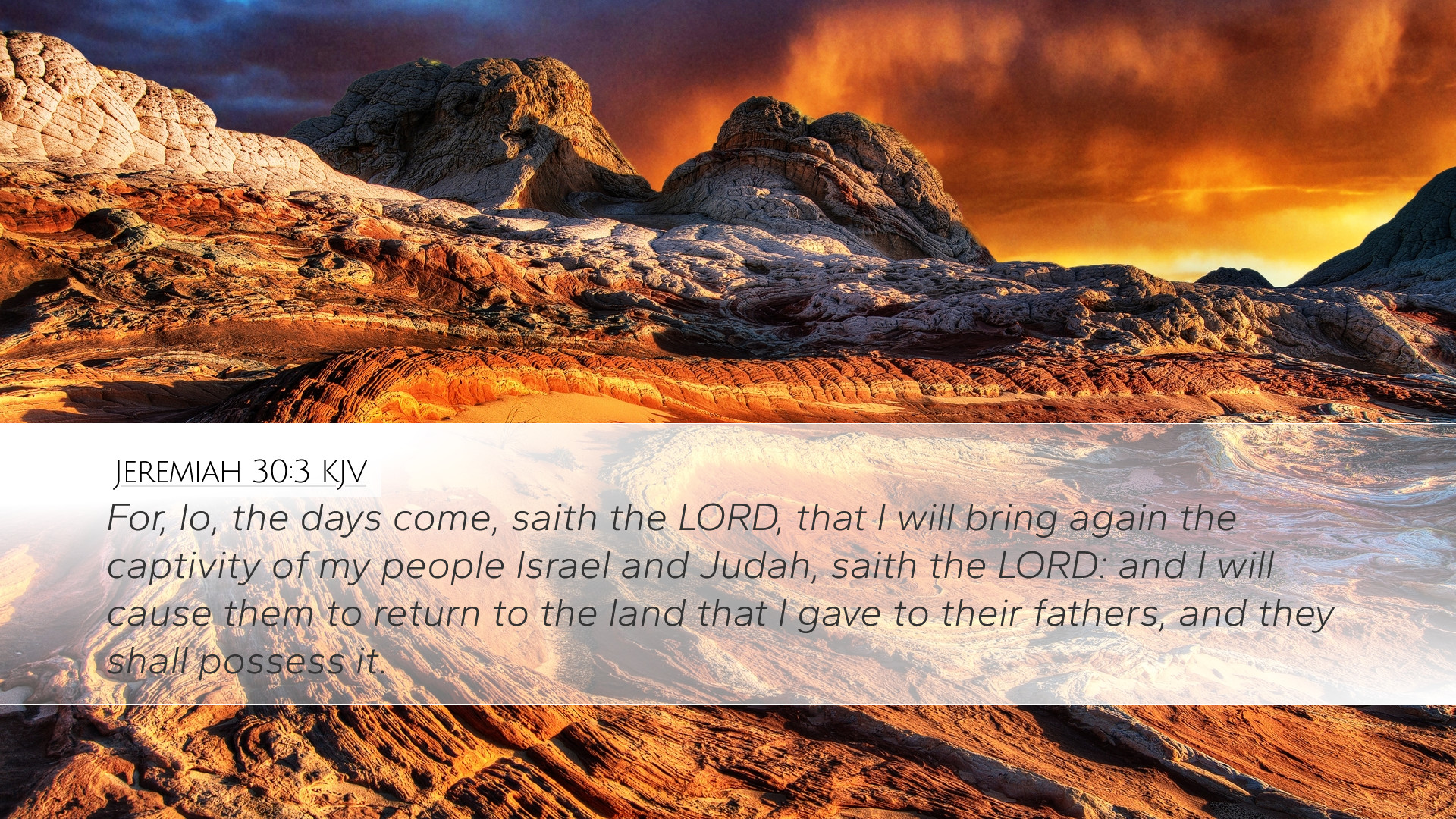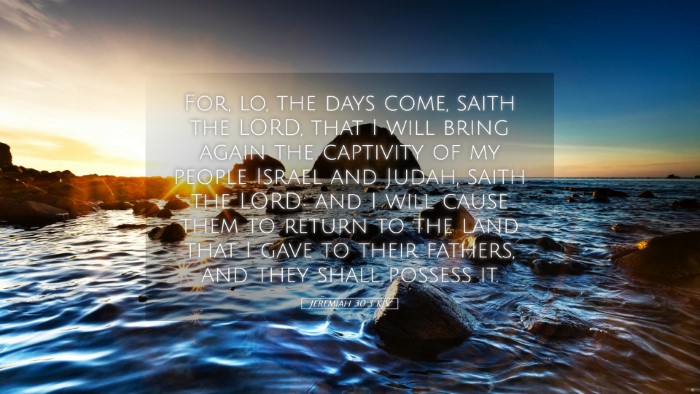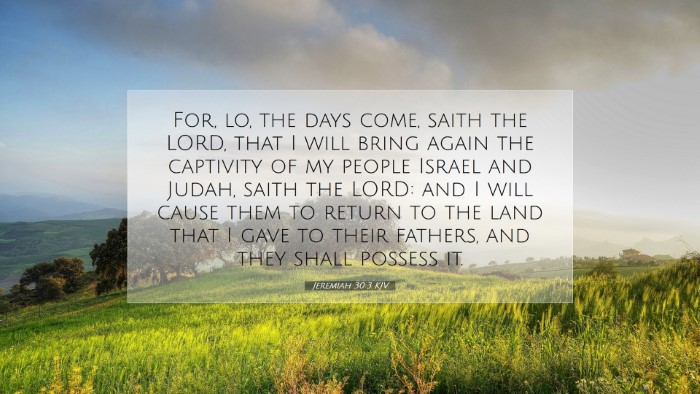Commentary on Jeremiah 30:3
Jeremiah 30:3: “For, lo, the days come, saith the Lord, that I will turn again the captivity of my people Israel and Judah, saith the Lord; and I will cause them to return to the land that I gave to their fathers, and they shall possess it.”
Introduction
The Book of Jeremiah is replete with profound prophetic messages that address the dire circumstances of the Israelites during the Babylonian Exile. Among these prophecies, Jeremiah 30:3 stands out as a beacon of hope, proclaiming the restoration and return of God’s people to their homeland. This commentary aims to explore the theological implications, historical context, and interpretative insights derived from esteemed public domain commentators such as Matthew Henry, Albert Barnes, and Adam Clarke.
Historical Context
This verse occurs within a section that is often referred to as the "Book of Consolation" (Jeremiah 30-33), which provides hope in the midst of despair. The Israelites, having faced destruction and exile, were in need of assurance regarding their future. They had been taken captive by the Babylonians, leading to a sense of abandonment and loss of identity.
The Significance of Captivity
- Spiritual Consequences: Captivity was not merely a geopolitical issue but represented a spiritual plight where the people of Israel felt distanced from God.
- Historical Reality: The historical backdrop of this prophecy is significant as it reflects the societal and relational dynamics between Israel, Judah, and Babylon.
Commentary Insights
Matthew Henry's Perspective
Matthew Henry emphasizes the certainty of God's promise regarding restoration. He notes that the phrase “the days come” indicates a future hope that transcends the present despair. God’s assertion of turning again the captivity signifies a deliberate action by Yahweh, showcasing His sovereignty and faithfulness to His covenant with Israel.
- Turn Again: Henry expounds that this implies not only the physical return of the exiles but a spiritual revival among them, recognizing their sinful ways and turning back to the Lord.
- The Land Promise: He asserts that the land promised to the fathers (Abraham, Isaac, and Jacob) symbolizes a restoration of relationship and covenant theology, where land ownership is intertwined with identity and divine favor.
Albert Barnes’ Commentary
Albert Barnes echoes the theme of divine restoration and emphasizes the comprehensive nature of God's mercy. He interprets this verse as an assurance that God will reinstate not only the fate of Israel but also Judah, which symbolizes the unification of the divided entities under God’s providence.
- The Captivity: Barnes explains that “captivity” implies a broader scope of suffering and bondage that encompasses both physical and spiritual exile. The assurance of return is thus profound, encompassing societal healing as well.
- Restoration of Ownership: He articulates that the return to the land is not merely a geographical relocation but a restoration of rights and promises that God bestowed upon their ancestors.
Adam Clarke's Analysis
Adam Clarke provides a critical exposition that highlights the dual fulfillment of this prophecy—both in the immediate restoration from Babylonian exile and in a more eschatological sense regarding the future of Israel. He posits that this promise is part of God’s larger redemptive plan for His people.
- Prophetic Duality: Clarke suggests a layered understanding of prophecy where immediate events have spiritual ramifications for future generations, thus transcending time.
- Possession of the Land: The concept of “possession” is accentuated, indicating that their return signifies not just a geographical re-gathering but implies a restoration of spiritual truths and God’s promises.
Theological Considerations
The theological implications of Jeremiah 30:3 are manifold. At the core lies the theme of hope and restoration, showcasing God's unwavering commitment to His people despite their unfaithfulness.
Hope and Restoration
This promise of restoration resonates through both history and personal faith journeys. Pastors and theologians can draw from this message to convey the importance of hope in the midst of adversity and the assurance that God remains faithful even when circumstances suggest otherwise.
Covenantal Theology
Understanding Jeremiah 30:3 through the lens of covenant allows for a deeper appreciation of God’s promises. The reiteration of the land pledge signifies God’s ongoing relationship with His people, reaffirming the unbreakable nature of divine covenants.
Conclusion
Jeremiah 30:3 serves as a profound reminder of God’s intentions to restore and bless His people. The insights from Matthew Henry, Albert Barnes, and Adam Clarke collectively emphasize the multifaceted nature of this promise. The intersection of historical context, spiritual meaning, and theological implications provides rich material for pastors, students, and scholars alike to explore the depths of God’s assurance of restoration and hope.
In the context of today's challenges, this message is timeless, encouraging believers to embrace the reality of God’s faithfulness and the promise of restoration in every aspect of life.


